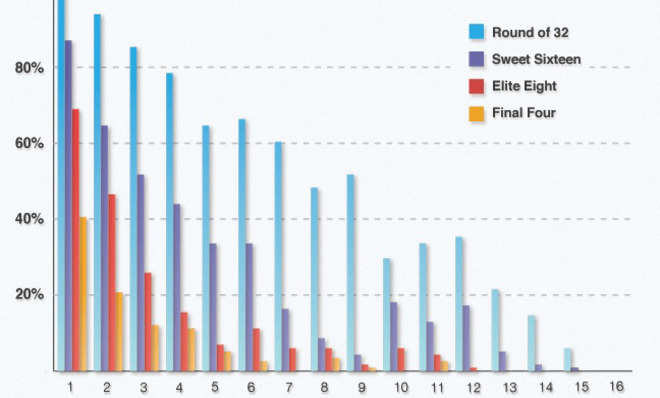Here's definitive proof that you should pick a #1 seed to win your March Madness bracket
Look at these charts, and never bet on a Cinderella again


A free daily email with the biggest news stories of the day – and the best features from TheWeek.com
You are now subscribed
Your newsletter sign-up was successful
Filling out a March Madness bracket is almost entirely guesswork. You can look up whatever stats you want, weigh individual matchups, or consult a psychic, but you're still going to get a bunch of things wrong; the odds of picking a perfect bracket are about one in 9.2 quintillion.
Truly, any team has a shot at winning it all, right? Well, not #16 seeds, none of which have ever advanced out of the first round. But what about everyone else? How far does each seed typically go in the tournament?
This chart shows how often each seed has advanced to a given round since the tournament went to a 64-team field in 1985.
The Week
Escape your echo chamber. Get the facts behind the news, plus analysis from multiple perspectives.

Sign up for The Week's Free Newsletters
From our morning news briefing to a weekly Good News Newsletter, get the best of The Week delivered directly to your inbox.
From our morning news briefing to a weekly Good News Newsletter, get the best of The Week delivered directly to your inbox.
Nearly 90 percent of #1 seeds reach the Sweet 16, and a little more than 40 percent make it to the Final Four. More often than not, #9 seeds prevail over #8 seeds. And seeds 10 through 12 flout the expected curve by reaching the Sweet 16 more often than do 8 and 9 seeds. Indeed, #12 seeds have reached the Sweet 16 twice as often as have #8 seeds. Why? If a #12 seed is lucky enough to win round one, it doesn't have to then face a #1 seed, as a #8 or #9 seed would have to.
Come the Final Four, seeds can cannibalize each other, so data on the last two rounds doesn't fit neatly into the above chart. So looking at those rounds separately, here's how often seeds advance to, and win, the final game.
As expected, top seeds almost always win. The top three seeds have won about 90 percent of the time over the past three decades. The only other winners: fourth-seeded Arizona in 1997, sixth-seeded Kansas in 1988, and eighth-seeded Villanova in 1985.
(And thanks to The Washington Post for building this incredibly helpful app.)
A free daily email with the biggest news stories of the day – and the best features from TheWeek.com
Jon Terbush is an associate editor at TheWeek.com covering politics, sports, and other things he finds interesting. He has previously written for Talking Points Memo, Raw Story, and Business Insider.
-
 Democrats push for ICE accountability
Democrats push for ICE accountabilityFeature U.S. citizens shot and violently detained by immigration agents testify at Capitol Hill hearing
-
 The price of sporting glory
The price of sporting gloryFeature The Milan-Cortina Winter Olympics kicked off this week. Will Italy regret playing host?
-
 Fulton County: A dress rehearsal for election theft?
Fulton County: A dress rehearsal for election theft?Feature Director of National Intelligence Tulsi Gabbard is Trump's de facto ‘voter fraud’ czar
